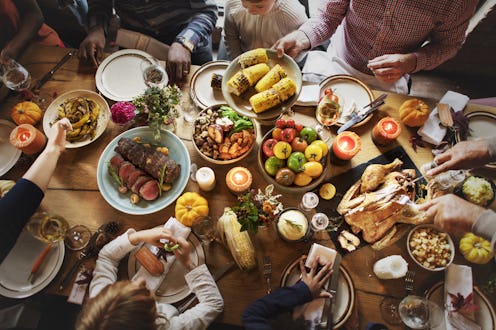Life
This Is How To Tell Your Toxic Family You’re Skipping Thanksgiving This Year

For some people, Thanksgiving is a time to gather with family, share warm memories, eat a delicious meal, and relax. If you deal with toxic family members, however, or if you’re a survivor of family abuse, the holidays can be very stressful. Self-care during the holidays can mean that you decide to opt out all together. If you’ve made the decision to skip Thanksgiving in order to avoid toxic family members, that’s a valid choice. However, it can be difficult to tell your family that you won’t be coming for Thanksgiving, and navigating this conversation safely is important.
“You know your family, perhaps all too well,” clinical psychologist Deborah Offner, PhD, tells Bustle via email. Fellow Bustler Kristine Fellizar wrote in a previous report that, in a non-toxic family dynamic, feelings of validation, love, and support usually outweigh any conflict that might come up. If you have a toxic family or family member, however, interactions with them can leave you feeling terrible more often than not.
Offner notes that “If you're at the point of considering skipping Thanksgiving, there's a good chance things are pretty bad. Think about the cost to you. Does it take you a week or more to recover from the toxic environment? Do you always come down with a terrible cold when you get home?" Stress, Offner notes, compromises immune functioning. "If you've answered yes to these questions or others like them, you need to take care of yourself [and stay home]. If not, you might reconsider.”
If you’ve decided to skip Thanksgiving this year, you might feel anxious about how your family might react. But know that you are not obligated to hang out with people who are harmful to your mental health, even if they’re related to you.
"It is easy for people who may not understand something to make you feel guilty," Kiaundra Jackson, LMFT, and author of Staying Sane In An Insane World, tells Bustle via email. "Sometimes being around family for the holidays causes more stress and anxiety than avoiding Thanksgiving altogether. Remember, it is your personal choice."
"You may not want talk about certain topics, visiting family can be a trigger of previous traumatic experiences, or you may simply want to start your own tradition — whatever the reasons are, own it. If you are uncertain in your decision, then they may convince you to go against your original plan," Jackson says.
Even so, telling your family that you won’t be home for Thanksgiving can feel intimidating, since interactions with toxic family members are, by definition, challenging. “The first decision is whether to be direct, or not," Offner says. "If your relationship with your family is the kind where it would be reasonable to simply say, I need to skip Thanksgiving because of x,y, or z (the dynamics, Uncle Ted, PTSD) be honest and clear. Know that even if your family does not like or respect your decision, it's yours to make.”
"Family is so complex, and each family dynamic is uniquely different — some may even be toxic," Jackson says. "So, the best way is to communicate effectively. Do not wait until you have already been assigned a dish to bring, or the day before Thanksgiving, to [tell] your family. Give them enough time to digest and soak it in. Give yourself enough time to process why this is the best option for your own mental health."
PsychCentral writes that, on top of stressors like travel schedules and financial worries, the holidays can be especially tough for anyone with a history of family abuse. The holidays can open up a lot of old wounds, and it makes sense if you just don’t need to go there. Offner warns that getting potentially retraumatized for the sake of a holiday party is a big risk to take with your mental health.
“If your family can't really hear why you're not coming, use another reason and spare everyone the discomfort/confrontation,” Offner says. "There are a number of practical interferences with spending Thanksgiving with your family. Perhaps you can choose one of these.” Offner suggests that covering an extra shift at work, or telling your family that you have to work can help. You might also tell them that you’ve decided to spend Thanksgiving with your friends or partner, or that you’ve decided to spend your Thanksgiving Day volunteering locally. While honesty is the best route whenever possible, if your family can’t listen to you in ways that feel safe to you, offer another excuse, says Offner. When it comes to dealing with a toxic family, “There’s brutal honesty, and then there’s everything else. You get to pick,” she says.
Jackson also suggests that you avoid texting when it comes to sensitive topics. "Text messages can be a great way to convey a quick message but can often be misunderstood," she says. "Instead, pick up the phone and speak with the person who typically hosts Thanksgiving. You do not have to call everyone in the family ... Prepare yourself prior to the call to answer any quick questions your family may have." Jackson notes, however, that "Self-care does not require an explanation to anyone. You have your reasons and that is enough."
While making the decision to opt out of Thanksgiving with your family might feel like a difficult choice, know that you have options when it comes to having that conversation. If you feel like your mental health might be compromised by showing up for the holiday, then do what's best for you.